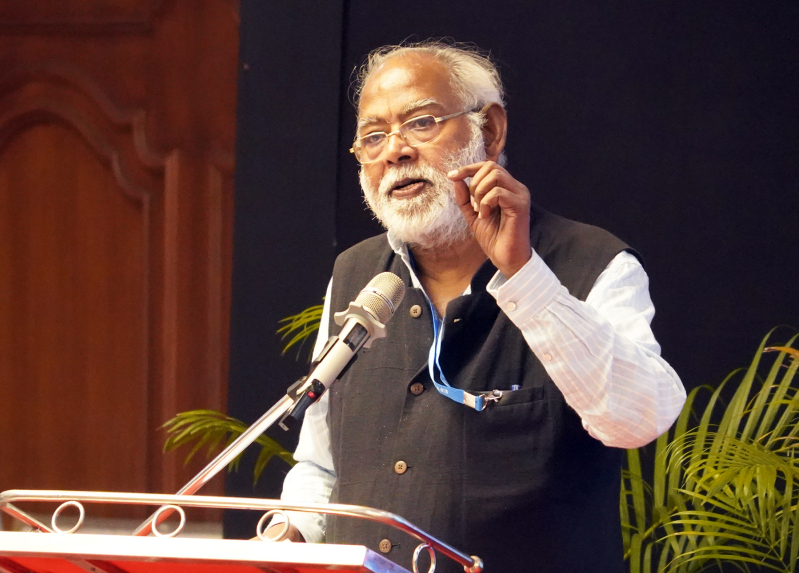
Data is not a dry technical subject but a vital tool for the Indian Church to understand its context and respond effectively, veteran journalist and advocate Dr. John Dayal told delegates at the All India Congress on Church in Mission (AICOCIM) during the evening session on the third day (Sept. 17).
Speaking from his decades of experience as a reporter, editor, and public voice, Dayal urged Christian leaders to take the collection and interpretation of data seriously. Without facts, he argued, the Church risks relying on assumptions, anecdotes, and outdated narratives that fail to capture present realities.
“The lack of empirical data has left many of our conversations shallow,” Dayal said. “We cannot plan for the future if we do not know the ground we are standing on.”
Journalism and the discipline of data
Dayal drew on his early years as a physicist-in-training and later as a journalist to illustrate why data matters. Reporting from conflict zones and political debates taught him to sift vast amounts of information quickly, identify what mattered, and communicate it with clarity. That skill, he said, is equally necessary for Christian leaders today.
In his career, Dayal covered stories that required him to learn not just language but also politics, sociology, and economics. The discipline of gathering information from the ground up — whether through census reports, surveys, or first-hand observation — became central to his understanding of India.
“Journalism taught me to look beyond the surface,” he explained. “Numbers on a page become meaningful only when they tell the story of people’s lives.”
Why data matters for the Church
For the Church, Dayal argued, data is essential for credibility. Numbers reveal where Christian institutions are strong, where they are shrinking, and where opportunities lie. He pointed to examples such as healthcare and education, noting that while Christians have long been recognized for their contributions, hard statistics are often missing or inconsistent.
Citing the diminishing number of mission hospitals compared to earlier decades, he warned that inflated claims without accurate data undermine trust. “We are told myths about how much we have done,” he said. “But myths cannot guide the future.”
Without reliable figures, he said, leaders cannot identify where resources are needed most, whether in urban centers, small towns, or rural regions. Nor can they engage effectively in public conversations about education, health, or social development.
Data as a way to serve communities
Dayal stressed that collecting and using data is not about self-promotion but about service. Information, he said, helps churches and organizations to meet people where they are.
“When we know the real situation of our schools, hospitals, and communities, we can respond with relevance,” he said. “Data is a way to listen to people’s lives.”
He gave the example of household surveys and census questions, which can reveal much about how families identify themselves, the challenges they face, and the opportunities they need. For Christians, this information can inform ministries that address health, education, livelihood, or pastoral care.
Drawing on his association with civic institutions, Dayal highlighted research organizations that have successfully influenced public debate by grounding their work in facts. He pointed to models like the Parliamentary Research Service, which provides legislators with concise policy briefs, and the Indian Social Institute, which produces studies on social justice and development.
Such organizations, he argued, show how systematic research can bridge the gap between grassroots realities and national conversations. The Church, he suggested, could develop similar structures to ensure that Christian perspectives are informed by evidence and presented with integrity.
Equipping leaders to use information
Dayal acknowledged that many pastors and leaders may feel intimidated by statistics or social science. But he insisted that basic training in how to read, interpret, and apply data could make a transformative difference.
“Short notes may work in Parliament,” he said, “but if we want to understand society, we need more than headlines.”
Workshops, courses, and collaboration with researchers, he suggested, could help Christian leaders become comfortable with data and use it to inform preaching, teaching, and planning.
While insisting on the importance of figures, Dayal also cautioned against reducing issues to charts and graphs. Data, he said, must always be connected to human stories.
As a journalist, he often found that statistics became powerful when paired with personal narratives — whether about health challenges, education struggles, or economic hardships. “The numbers give credibility, and the stories give heart,” he said. “We need both.”
Preparing for the future
Dayal’s address ultimately called for the Church to embrace data as part of its discipleship and mission in society. By developing a culture of research, by documenting its institutions and their impact, and by listening carefully to the realities revealed in numbers, the Church can position itself as a credible partner in addressing national challenges.
“This is not about boasting of achievements,” he concluded. “It is about knowing the truth, so that we can serve with integrity.”
In closing, Dayal encouraged AICOCIM participants to see data not as the domain of academics alone but as a resource for every pastor, educator, and health worker. He urged the formation of initiatives within Christian networks that would collect information systematically and share it widely.
By doing so, he said, the Church could move from assumptions to evidence, from myths to facts, and from scattered efforts to strategic impact.
“Without data, our vision remains blurred,” he said. “With it, we can see clearly the path that lies ahead.”






